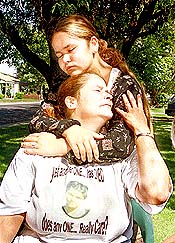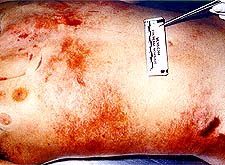'Pattern of abuse'
Institution won't close, chief vows
By Dennis Wagner, The Arizona Republic , Aug. 27, 1998
The death of 16-year-old Nicholaus
Contreraz last spring was part of "a
pattern of abuse and neglect" at
Arizona Boys Ranch that led to at
least 29 other reported incidents,
state officials say.
Linda Blessing, director of the state
Department of Economic Security,
said some of the mistreatment
occurred even as authorities
swarmed over the Ranch to
investigate Contreraz's death.
Blessing announced Wednesday
that she has denied Boys Ranch a
new license based on an exhaustive
investigation that uncovered multiple
violations of state law and rules.

In Sacramento, Julie Vega,
hugged by her daughter,
Yvonne Correa, 13, reacts to
news of the release
Wednesday of the state report
on the death of her son,
Nicholaus Contreraz.
Photo: Rich Petroncelli/Associated Press
Bob Thomas, president of Boys Ranch, said he has not had a
chance to review the reports, but he has no intention of closing
down an institution that operates campuses statewide and has
worked with delinquent youths for 49 years.
"We will appeal," Thomas vowed. "We are not going to let these
kids down. ... We plan on going forward. Boys Ranch has been in
business for almost a half-century. We've served thousands of
kids."
Blessing's announcement came five months after Contreraz
succumbed while being punished at a Boys Ranch boot camp in
Oracle.
DES specialists concluded
that 17 Boys Ranch
employees, including some
supervisors, were culpable
for 32 instances of abuse or
neglect involving Contreraz.
"The egregious nature of
these violations make our
decision clear," Blessing
said. "The death of any
child is tragic, and
Nicholaus' death was
especially so.
"The circumstances
surrounding his death, and
the repeated treatment of
other residents,
demonstrate a pattern of
abuse and neglect by
Arizona Boys Ranch, and a
lack of concern by senior
management and line staff
for the rights of youth
placed in their care and
custody," she said.
Details of the allegations are contained in about 4,000 pages of
documentation released Wednesday by the Licensing and Child
Protective Services branches of DES.
 Department of Economic Security
autopsy photos of Nicholaus Contreraz
show some of the abrasions and
bruises on his body. The curved marks
on his chest and a small puncture
wound near the breastbone were
caused by resuscitation efforts.
Bruising and abrasions along the right
side and on the abdomen could have
come from a number of causes,
including being dragged, pushed down
to the ground, or being repeatedly
grabbed around the midsection, DES
officials contend. The dark red mark at
the bottom right of the torso, near the
top of the leg, is a deep abrasion,
similar to a a severe rug burn.
Department of Economic Security
autopsy photos of Nicholaus Contreraz
show some of the abrasions and
bruises on his body. The curved marks
on his chest and a small puncture
wound near the breastbone were
caused by resuscitation efforts.
Bruising and abrasions along the right
side and on the abdomen could have
come from a number of causes,
including being dragged, pushed down
to the ground, or being repeatedly
grabbed around the midsection, DES
officials contend. The dark red mark at
the bottom right of the torso, near the
top of the leg, is a deep abrasion,
similar to a a severe rug burn.
Blessing emphasized that Boys Ranch has a right to appeal, and it
can remain open while the case is pending. However, she made it
clear that the organization's future hinges on revised policy and
leadership.
"We want to see a change in the organization's culture," she said.
'They're surrounded'
Meanwhile, Boys Ranch seems so mired in legal, financial and
publicity problems that, as one state official put it, "They're
surrounded."
The FBI and Pinal County Attorney's Office are conducting
criminal evaluations in connection with Contreraz's death and other
abuse complaints. Charges could be lodged not only against
staffers, but against management and the non-profit corporation.
Boys Ranch's license
expires Sept. 15, and
operations could be shut
down as early as October if
appeals fail.
Contreraz's family has
retained an attorney and is
expected to file a lawsuit.
California, which provided
about three-quarters of the
placements at Boys Ranch,
has cut off funding and individual counties have withdrawn nearly all
of those juveniles. Other states also have pulled back placements.
The majority of Boys Ranch residents are placed by juvenile courts
and probation departments. But now enrollment has dwindled from
nearly 600 youths at seven locations to 150 boys staying at the
main campus in Queen Creek and a summer camp on Mount
Lemmon near Tucson.
Each lost youth represents about $3,600 per month, and Thomas
said 60 of the remaining boys are on scholarship because
government agencies won't fund them.
He acknowledged that Boys Ranch, with an annual budget of
$26.5 million, depends on that income -- and faces a financial
crunch. Already, Boys Ranch has reduced staffing from about 350
employees to 70.
Still, Thomas said, the private,
non-profit organization will
scrimp, cut salaries and seek
donations to survive.
"We're not rich, but we're going
to beg, borrow and steal to
keep this program going," he
added. "No, we can't do it
forever."
Thomas said he still hopes to
work in cooperation with DES
to "make this a win/win situation
for everyone."
But he disputed Blessing's
contention that there is a pattern
of abuse at Boys Ranch, and
said he has no intention of
leaving, or of making any other
leadership changes.
"We all plan to be here," said
Thomas, who has directed Boys
Ranch since 1976. "My
management team has been here
for a lot of years."
Ranch's checkered history
Boys Ranch's history is
checkered with allegations that
juveniles have been mistreated.
The complaints, and feuds with
state regulators, stem in part
from of the organization's
hands-on method of dealing
with belligerent teenagers.
At least three previous state
investigations resulted in
allegations of serious abuse.
Two years ago, DES employees
wrote a rebellious letter to their
boss after Boys Ranch's license
was renewed, complaining that
the program was "a severe risk
to children."
In the face of such criticism,
Thomas and Boys Ranch
typically fight back.
After a 1994 DES report ripped
Boys Ranch for punching,
choking and otherwise
assaulting kids, an investigative
team led by former U.S.
Attorney A. Melvin McDonald
was paid $400,000 to
investigate the investigators.
McDonald concluded that
abuse claims were bogus -- the
product of biased investigators
and manipulative boys.
Boys Ranch sued DES. It sued
The Arizona Republic for a
news report on a juvenile who
drowned during an escape
attempt. And it sued a
University of Illinois professor
who wrote that ranch managers
"condoned or ignored a pattern
of violence." The suit against The Republic is pending.
Blessing and other DES employees emphasized Wednesday that
every allegation in the Contreraz case was substantiated by Boys
Ranch workers and documents.
Based on more than 50 interviews of Boys Ranch employees, she
concluded that Ranch workers contributed to Contreraz's death.
She blamed not only medical neglect, but a practice of physically
"addressing" juveniles and "assisting" them with work or exercises.
DES licensing inspectors found that Boys Ranch employees
repeatedly abused, threatened and taunted juveniles, and failed to
provide health care or to document injuries.
In addition, the DES report indicates Boys Ranch refused to
cooperate with state licensing inspectors who sought records.
Boys Ranch's license was denied based on those incidents, a
history of violations and the organization's inability or unwillingness
to meet the needs of children, according to DES administrators.
Thomas complained that DES did not allow Boys Ranch to see the
findings or correct errors. When told about DES allegations that a
staffer had rubbed a boy's face in sheep manure, he said that
exemplifies flaws in DES reporting.
"This boy was totally out of control. He had three staffers down,"
Thomas said. "We did not rub his head in sheep manure. . . . It
comes to this: Who do you believe, the kids or the staff?"
Thomas said he intends to have professional investigators review
the findings, and McDonald already is working with him.
Thomas said Boys Ranch is one of the best juvenile-treatment
programs in America. He noted that about 40 California juveniles,
who were withdrawn from the program after Contreraz's death,
voluntarily returned.
"They didn't do that at Auschwitz," Thomas said.
Meanwhile, Boys Ranch still has a core of staunch supporters --
especially among graduates and their families.
At the Queen Creek headquarters, staff members went about their
business Wednesday while groups of boys strolled from class to
class.
In the morning, a vanload of residents and a staffer drove to a
nearby convenience store to buy snacks. Reporters and
photographers were not allowed on campus.
Queen Creek Mayor Mark Schnepf said Contreraz's death was
not reason enough to close a program that has taught delinquents
respect for themselves and others for more than 40 years.
"Many organizations that deal with troubled people have tragedies,
but when a tragedy occurs with the Sheriff's Office or Child
Protective Services, we don't talk about shutting those agencies
down. We talk about fixing the problems and making sure the
problem doesn't happen again," Schnepf said.
Thomas' message to supporters: "Keep the faith. This, too, shall
pass."
***
Dennis Wagner can be reached at dennis.wagner@pni.com
via e-mail or at 1-602-444-8874.
Return to BOOT CAMP FOR KIDS: TORTURING TEENAGERS FOR FUN AND PROFIT
Return to Table of Contents

 Department of Economic Security
autopsy photos of Nicholaus Contreraz
show some of the abrasions and
bruises on his body. The curved marks
on his chest and a small puncture
wound near the breastbone were
caused by resuscitation efforts.
Bruising and abrasions along the right
side and on the abdomen could have
come from a number of causes,
including being dragged, pushed down
to the ground, or being repeatedly
grabbed around the midsection, DES
officials contend. The dark red mark at
the bottom right of the torso, near the
top of the leg, is a deep abrasion,
similar to a a severe rug burn.
Department of Economic Security
autopsy photos of Nicholaus Contreraz
show some of the abrasions and
bruises on his body. The curved marks
on his chest and a small puncture
wound near the breastbone were
caused by resuscitation efforts.
Bruising and abrasions along the right
side and on the abdomen could have
come from a number of causes,
including being dragged, pushed down
to the ground, or being repeatedly
grabbed around the midsection, DES
officials contend. The dark red mark at
the bottom right of the torso, near the
top of the leg, is a deep abrasion,
similar to a a severe rug burn.